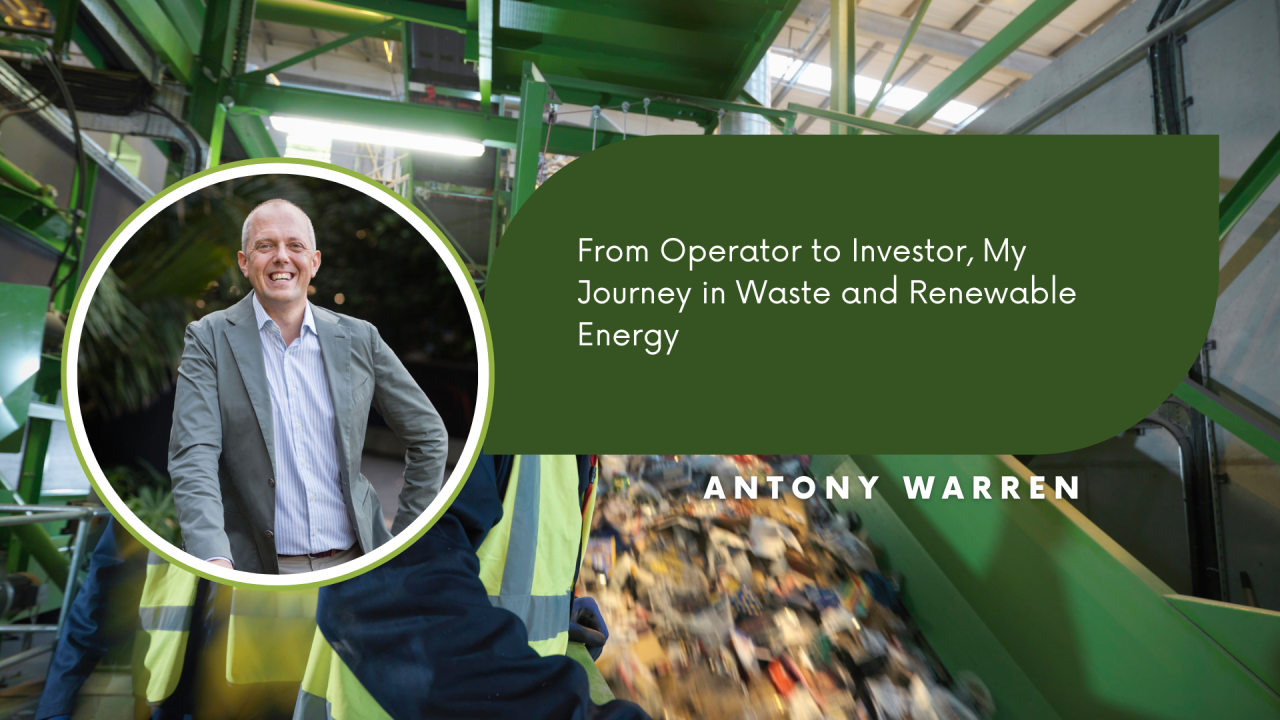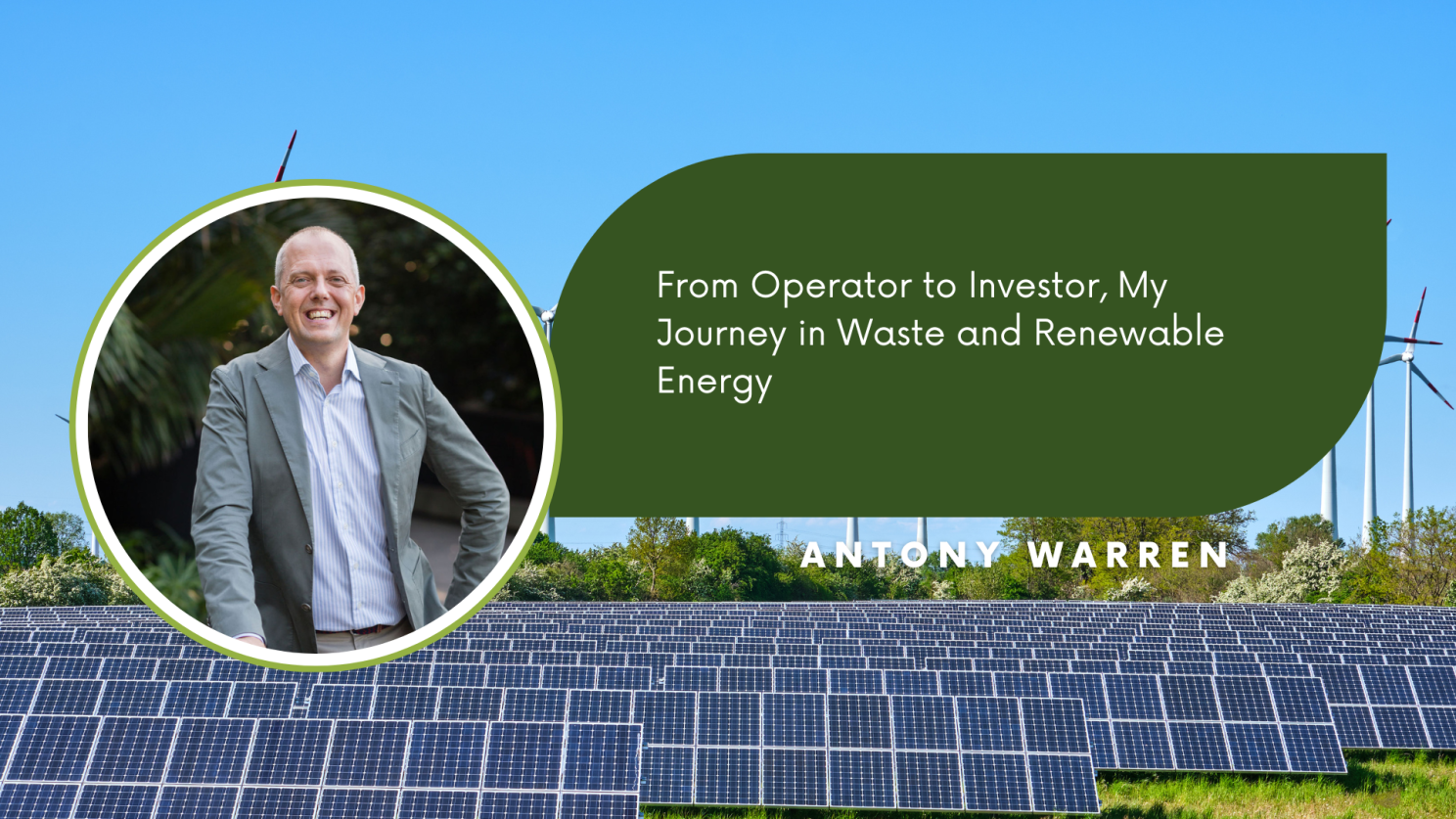
Over the past two decades, my work in the waste and renewable energy sectors has been both demanding and immensely rewarding, creating opportunities to innovate, lead, and grow at scale.
As I embark on a new chapter at SC Oscar Fund Management, I am thrilled to work with a highly skilled team and to collaborate with project developers and investee companies, pooling our collective expertise to help forge a low-carbon, waste-free, regenerative future. This role offers a unique opportunity to broaden my impact and further contribute to the global journey toward sustainability.
In my new capacity as Managing Partner at SC Oscar, I will draw heavily on the lessons I have learned over the last twenty years of promoting sustainable resource utilisation—from my earliest experiences in my family’s waste management business, to building one of the UK’s largest biomethane facilities, and ultimately founding Eden Impact to invest in companies driving change in the circular and regenerative economy. These milestones have shaped my passion for tackling environmental challenges and driving transformative solutions.
Over the years, I’ve picked up valuable insights from my experiences in the waste and renewable energy sectors. Here are my top 10:
1. Find your niche and expand across adjacent sectors
Our family business, Warren’s Group, spent three generations collecting waste from abattoirs, butchers, and farms: a highly competitive market with limited potential for further growth.
We capitalised on our strong relationships and regulatory expertise to move into an emerging adjacent sector with little competition. At that time, biogas and biomethane were “blue ocean” opportunities.
2. Strategic vision requires resilience
We started developing the biogas business in 2007, and spent five years planning, obtaining permits, fundraising and construction before we started operating in 2012. Raising capital during the global financial crisis of 2008-9 was not easy. Venture capital firms saw value in our business idea, but many wanted us to scale quickly across the UK and Europe and build several plants at once.
But we knew our strengths and competitive advantage: our strategy was to stay local and leverage our relationships in supply chains we knew well. Even in moments of desperation, we recognised that abandoning our strategic vision for short-term gains could jeopardise long-term success.
3. Plan for expansion with discipline
Our successful expansion over seven years was facilitated by strategic foresight and design flexibility. Despite short-term capital constraints, we incorporated scalability into our initial designs. For instance, we specified oversized transformers, grid connections, and anaerobic digestion capacity—elements that have long-lead times and are disruptive to install later that added minimal cost upfront.
With effective planning, we could work on expansion while running operations smoothly. We scaled from generating enough power for about 5,000 households to powering more than 25,000 households and providing comprehensive food waste collection services to over a thousand client sites—all without any plant downtime.
4. Master business valuations and time your exit
As our waste management and biogas business grew more complex, strategic and financial skills were needed. I pursued an Executive MBA at Cambridge University, and mastering Corporate Finance helped us to consider selling the waste treatment and biomethane business.
While speaking with buyers, we remained committed to our growth plans. One of the conditions of sale was that we insisted on capturing not only the value of our ongoing operations, but also some of the future growth potential we had engineered through our foresight and planning.
We were determined not to rush into a deal that undervalued our business. This discipline ultimately helped us secure a sale on terms that valued both our current success and future growth potential. This reflects the importance of knowing how to value your business accurately, present it to investors, and time your exit when market conditions are favourable.
5. Build strong relationships
I learned the importance of cultivating strong relationships—with customers, regulators, partners, and even, where permissible, competitors—from working alongside my parents and brother. These connections open doors to new opportunities and offer mutual support during challenging periods, all while making the work itself more rewarding.
Strong relationships make difficult conversations and situations much easier to navigate. In the UK, the gas network regulator that oversees biomethane injection sites can shut off injection flow to protect their network. By investing time and energy upfront to visit the operator, meet the team and learn their processes and to make myself accessible to them all, we benefitted from the highest level of injection flow time of our competitors: the opportunity cost of which far exceeds the effort it took to establish these important relationships.
6. Plan for contingencies, manage your risk
No matter how thoroughly you plan, the unexpected will happen: equipment failure, regulatory changes, sudden market shifts. Having robust contingency plans is crucial. This involves both establishing backup systems and cultivating a flexible mindset.
We embedded contingency planning into every aspect of our operations: having (back-up) contractor staff and alternative vehicle hire options, office staff trained as drivers, critical spare parts on site, and so on. We focused on ensuring we could continue to serve our customers under any circumstances.
Some competitors, when faced with a breakdown, would stop accepting waste, leaving their customers in the lurch. This is a serious issue, especially for food manufacturers: the inability to dispose of waste can halt production and lead to compliance and audit problems. We ensured that for each customer, we had at least one alternative disposal site available for each waste stream: a proactive approach that resulted in almost zero customer churn.
7. Embrace respected conflict for innovation and better decision-making
Healthy debates and robust discussions are essential: encouraging team members to voice differing opinions leads to more thorough analyses and better decisions.
We didn’t worry if conversations became a bit heated; it was the resolution, and the insights gained that mattered. When everyone was heard, we arrived at the best outcomes for the business, focusing on collective success rather than individual pride or position.
8. Keep abreast of technological advances
In sectors like biogas and renewable energy, keeping up to date on the latest technology gives you a significant competitive edge. For us, constantly updated knowledge meant improved efficiency, reduced costs, and better solutions for our customers.
Many companies fall into the trap of strategic inertia, becoming overly focused on their chosen technology or path and ceasing to explore new opportunities. We avoided this by remaining flexible: for our biogas facility, we initially installed Combined Heat and Power (CHP) gas engines, only to later diversify into biomethane injections and vehicle fuel production. We didn’t get stuck on one technology.
9. Recognise the challenges of logistics management
It may come as a surprise, but the most challenging aspect of my career hasn’t been dealing with new technologies, engineering complexities, regulators, or planning and permitting—it has been managing logistics. Operating a fleet of 70 vehicles means overseeing a driver workforce even larger than that. Despite maintaining a relatively young fleet, there were daily issues to be managed.
This underscores the importance of meticulous contingency planning, and proactive management. Efficient logistics are crucial in waste management and directly impact profitability. Drivers are the face of the company and require thorough training in customer service and conflict resolution. Failure at any point of the supply chain will affect overall performance and customer perception.
We prioritised optimising routes and diligently maintaining vehicles to reduce costs and minimise environmental impact. This approach focused on enhancing efficiency and reducing waste in all forms, allowing us to maintain, and even improve customer service standards all whilst growing the business.
10. Be a leader in the regulatory environment
Waste management, construction, logistics, and renewable energy are all regulated industries, with frequent revisions to the regulatory environment, particularly regarding waste permitting. Staying informed about current and upcoming regulations is crucial for effective planning and ensuring compliance, as well as avoiding costly penalties and reputational damage.
Being at the forefront of regulatory requirements and serving as an exemplar can also work in your favour when regulations evolve: setting high standards can influence industry norms and raise the bar for competitors. As an early mover recognised for excellence, our anaerobic digestion facility was often used by UK regulators for site tours. Consequently, when new standards for environmental protection were established—covering odour control, lightning protection, or procedural methods such as Hazard Analysis and Critical Control Points (HACCP) plans— our site often set the gold standard for the sector.
The journey continues...
These ten lessons are a product of the challenges and successes that have defined my career in waste and renewable energy.
At SC Oscar Fund Management, I look forward to building on this foundation, working alongside talented teams to tackle pressing environmental issues, and hope to share more about our impact and progress towards the energy transition and decarbonisation in Asia Pacific.
